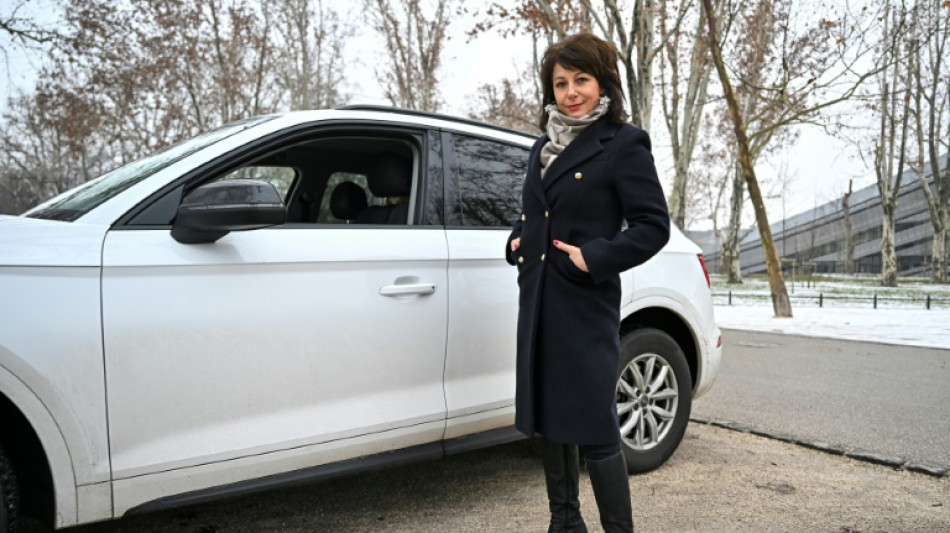
-
 Vance discusses migration during Vatican meeting with pope's right-hand man
Vance discusses migration during Vatican meeting with pope's right-hand man
-
Afghan FM tells Pakistan's top diplomat deportations are 'disappointment'

-
 British cycling icon Hoy and wife provide solace for each other's ills
British cycling icon Hoy and wife provide solace for each other's ills
-
Money, power, violence in high-stakes Philippine elections

-
 Iran, US hold second round of high-stakes nuclear talks in Rome
Iran, US hold second round of high-stakes nuclear talks in Rome
-
Japanese warships dock at Cambodia's Chinese-renovated naval base

-
 US Supreme Court pauses deportation of Venezuelans from Texas
US Supreme Court pauses deportation of Venezuelans from Texas
-
Pakistan foreign minister arrives in Kabul as Afghan deportations rise

-
 Heat and Grizzlies take final spots in the NBA playoffs
Heat and Grizzlies take final spots in the NBA playoffs
-
Iran, US to hold second round of high-stakes nuclear talks in Rome

-
 Humanoid robots stride into the future with world's first half-marathon
Humanoid robots stride into the future with world's first half-marathon
-
Migrant's expulsion puts Washington Salvadorans on edge

-
 Plan for expanded Muslim community triggers hope, fear in Texas
Plan for expanded Muslim community triggers hope, fear in Texas
-
Pakistan foreign minister due in Kabul as deportations rise

-
 White House touts Covid-19 'lab leak' theory on revamped site
White House touts Covid-19 'lab leak' theory on revamped site
-
Dodgers star Ohtani skips trip to Texas to await birth of first child

-
 US senator says El Salvador staged 'margarita' photo op
US senator says El Salvador staged 'margarita' photo op
-
Ford 'adjusts' some exports to China due to tariffs

-
 Thomas maintains two-shot lead at RBC Heritage
Thomas maintains two-shot lead at RBC Heritage
-
US to withdraw some 1,000 troops from Syria

-
 Four killed after spring storms wreak havoc in the Alps
Four killed after spring storms wreak havoc in the Alps
-
Spurs' Popovich reportedly home and well after 'medical incident'

-
 Trump goes to war with the Fed
Trump goes to war with the Fed
-
Celtics chase second straight NBA title in playoff field led by Thunder, Cavs

-
 White House site blames China for Covid-19 'lab leak'
White House site blames China for Covid-19 'lab leak'
-
Norris edges Piastri as McLaren top Jeddah practice

-
 Trump warns US could ditch Ukraine talks if no progress
Trump warns US could ditch Ukraine talks if no progress
-
Judge denies Sean 'Diddy' Combs push to delay trial

-
 80 killed in deadliest US attack on Yemen, Huthis say
80 killed in deadliest US attack on Yemen, Huthis say
-
Lebanon says two killed in Israeli strikes in south

-
 Trump says US will soon 'take a pass' if no Ukraine deal
Trump says US will soon 'take a pass' if no Ukraine deal
-
F1 success is 'like cooking' - Ferrari head chef Vasseur

-
 Cycling mulls slowing bikes to make road racing safer
Cycling mulls slowing bikes to make road racing safer
-
Macron invites foreign researchers to 'choose France'

-
 Klopp 'happy' in new job despite Real Madrid rumours: agent
Klopp 'happy' in new job despite Real Madrid rumours: agent
-
Alcaraz into Barcelona semis as defending champion Ruud exits

-
 Vance meets Italy's Meloni before Easter at the Vatican
Vance meets Italy's Meloni before Easter at the Vatican
-
Evenepoel returns with victory in Brabantse Pijl

-
 Maresca confident he will survive Chelsea slump
Maresca confident he will survive Chelsea slump
-
Mob beats to death man from persecuted Pakistan minority

-
 Lebanon says one killed in Israeli strike near Sidon
Lebanon says one killed in Israeli strike near Sidon
-
Arsenal's Havertz could return for Champions League final

-
 US officials split on Ukraine truce prospects
US officials split on Ukraine truce prospects
-
Client brain-dead after Paris cryotherapy session goes wrong

-
 Flick demands answers from La Liga for 'joke' schedule
Flick demands answers from La Liga for 'joke' schedule
-
'Maddest game' sums up Man Utd career for Maguire

-
 Trial opens for students, journalists over Istanbul protests
Trial opens for students, journalists over Istanbul protests
-
Gaza rescuers say Israeli strikes kill 24 after Hamas rejects truce proposal

-
 'Really stuck': Ukraine's EU accession drive stumbles
'Really stuck': Ukraine's EU accession drive stumbles
-
'Not the time to discuss future', says Alonso amid Real Madrid links


Border-free EU travel brings 'thrilled' ethnic Hungarians closer
Visiting Hungary as a teenager, opera singer Katalin Benedekffy used to have to wait up to a whole day at the border with her childhood home, Romania. Now, to her delight, she can cross straightaway.
In the early hours of New Year's Day, she made the crossing unhindered for the first time, after Romania joined Europe's border-free travel zone.
"It's a miracle," said Benedekffy.
"I asked my husband to back up because I wanted to record it," she told AFP. "It's an incredible feeling."
Benedekffy, 47, now lives in Budapest and often travels back and forth to visit relatives in her hometown of Szeklerland in Romania's Transylvania region. She made her first control-free crossing on her return trip to Hungary.
"It's like being in the same country as my loved ones, as there are practically no borders anymore," she said.
For centuries, the region was part of the Austro-Hungarian empire in so-called "Greater Hungary" -- a notion referred to with nostalgia by the current nationalist government in Budapest.
Almost a fifth of Hungary's population has relatives in neighbouring countries, within the historical boundaries of what was Hungary before it was partitioned in the aftermath of World War I, a 2020 survey showed.
Romania and Bulgaria became full members of Europe's so-called Schengen zone from January 1, when land border checks ceased.
That ended years of waiting for the countries after they qualified to join Schengen, with political resistance from certain other EU states having delayed the move.
- 'Trianon trauma' -
Hungarian Prime Minister Viktor Orban, who took credit for the final negotiations on joining Schengen, hailed the expansion as an "important step for national unity" that dismantled barriers "between families".
About one million ethnic Hungarians -- Magyars -- live in Romania, the largest such community outside of Hungary, with other significant ones in Slovakia, Serbia and Ukraine.
Under the Treaty of Trianon, signed in Versailles in 1920 after the dissolution of the defeated Austro-Hungarian empire, Hungary had to surrender two-thirds of its territory to neighbouring states.
Many Hungarians still resent the territorial and population losses, sometimes described as "Trianon trauma".
Since Orban's return to power in 2010, the nationalist leader has regularly irked neighbouring countries by focusing on pre-World War I Hungary's territory.
Orban has continued to woo Magyar communities by opening up an easy path to Hungarian citizenship -- and thus voting rights -- and financing projects such as schools for them.
- 'Imaginary wall' -
Following the fall of communism in 1989 -- years before Orban's rise to power -- one of Hungary's main foreign policy goals was to "make surrounding borders irrelevant, without revising them", Nandor Bardi, an expert on minority research at the Hungarian HUN-REN research centre, told AFP.
Magyars are "relieved it finally happened", he said.
Benedekffy well remembers the "humiliating waits" of up to 24 hours at the border that she had endured since she was a girl.
Although waiting times significantly decreased after Hungary and Romania joined the European Union -- in 2004 and 2007 respectively -- lorry drivers and travellers still had to queue for at least an hour at border crossings, police told AFP.
"We used to do calculations, how to avoid delays at the border," said Zoltan Nagy, 39, a manager at a car manufacturer in Budapest.
He once celebrated Easter with his family in Transylvania two weeks in advance to avoid the crowds.
But now "the journey has become a lot more predictable -- we no longer have to stress about how much time we spend at the border".
In neighbouring countries with Magyar populations, Orban's policies have stirred up fears that he is trying to exert influence on their territory.
Criticising Brussels and courting US President Donald Trump and Russia's Vladimir Putin, the nationalist leader is nowadays "more concerned about geopolitics", however, said analyst Bardi.
The disappearance of border checks holds symbolic value for many Transylvanian Magyars, such as Mihaly Fazakas, a 77-year-old retired textile engineer.
"We are thrilled because we no longer have that imaginary wall dividing us," he told AFP.
"It feels almost as if Transylvania got returned."
A.Zbinden--VB


